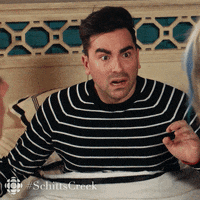Hi, I’m Kate. Ask an Author is a free newsletter providing advice and support for authors at all stages of writing, publishing, and hand-wringing. If you know someone this applies to, you can forward them this email and encourage them to sign up. Have a question? Fill out this form and I’ll answer it in a future response.
QUESTION:
You answered a question about where to find writing partners (thank you!) and it got me thinking about my own feelings about feedback, and a sort of predicament I sometimes find myself in. I have two close writing friends and we all share work. I’m really lucky to have them … but sometimes I also feel caught in the middle. I don’t always know whose advice to take, especially when they might contradict each other, like one reader says they love a scene and the other reader really doesn’t. I worry I’ll hurt someone’s feelings, or worse. Like you said in your response, they might not want to stay in the group. Any advice?
— Caught in the Middle
Dear Caught,
I’m so glad the question about writing partners resonated and that you have your own close group with whom to share work. And I SO, SO sympathize with the challenges that can arise when you work closely with a group. It can be wonderful to know when you share a piece with someone that you’ll continue to talk about it, mull through it, maybe even share it again after you’ve worked on revisions. But I hear you that this can be fraught. If a friend says “YOU ABSOLUTELY MUST CUT CHAPTER 17” and you, Brilliant Author, don’t cut Chapter 17… then what???
I’d like to answer your question about you by starting with a story about me. :-)
When I was an undergrad eleventy billion years ago, I had the incredible privilege of writing a poetry thesis with Pulitzer Prize winner Frank Bidart as my advisor. (He hadn’t won the Pulitzer yet, but we all knew it was only a matter of time.) Frank is an incredible poet and teacher, and I spent every meeting with him in a kind of reverential trance. If Frank said to cut a stanza, I cut the stanza. If Frank said to change a word, I changed the word. He was Frank Bidart! In my mind, he knew everything.
The year that I was his advisee, Frank published a new collection of poems and was often away giving readings and fretting about how is book was doing (humbling, isn’t it, to realize *everybody* frets?). There was a new Visiting Professor in town, Dan Chiasson, who was also a BFD (that’s “Big Fucking Deal” in sophisticated poet-speak) and whose literary star has only continued to rise. Because Dan was new and didn’t yet have a permanent position, he didn’t have any students of his own. We developed a rapport and I became something of his informal advisee, too.
An abundance of riches! Truly I cannot believe how spoiled I was two have these two poets reading my work and taking me seriously as a writer.
AND ALSO.
It was so stressful — for exactly the reasons you’ve described, Caught. I remember one poem Frank said was “the best in the collection,” and he specifically identified a stanza that he thought made the whole thing work. (YAY!)
And then…
When I met with Dan, he had issues with one poem in particular and thought I should cut it from the collection. No matter what, he said, I should absolutely cut this one stanza that didn’t work at all.
I’m sure that you, gentle reader, who knows all about narrative and foreshadowing and setup, can see where this was going. Lo and behold they were talking about not only the same poem but THE EXACT SAME STANZA.
I remember meeting with a third advisor — my major advisor, the Modernist powerhouse Kate Brogan — to ask her what to do. What I wanted was for her to act as some kind of broker between the two men I was caught between, as though she could tell me, “Listen to Frank, he’s your official advisor and has more experience.” Or, “Listen to Dan, he’s got his finger on the pulse and knows what he’s talking about.”
Instead, Kate shared a letter the poet Elizabeth Bishop sent to Robert Lowell admonishing him not to publish The Dolphin, which would later go on to win a Pulitzer. Everyone gives different advice, Kate was saying. But I was the one writing this collection. It was up to me to make my own decision.
I left her office still thinking I had to “please” these other poets and do the things they wanted. But over time, I do think the lesson began to sink in, and I’m grateful to Kate for asking what I wanted the collection to be, independent of what anyone else thought. I didn’t have an answer for her then (although if memory serves me right, I did leave the poem — and that stanza — in its entirety). But now I can better see what she was trying to tell me. We can take feedback from all different sources, and as I wrote in my response about writing groups, there’s so much value that comes from finding your trusted readers and letting them show you your work in new ways.
But at the end of the day, YOU are the writer. You can’t serve two masters. You can’t even serve one master. You have to make the best decisions you can regardless of how others try to steer you.

So, where does this leave you, Caught?
For one thing, just because one of your writing partners gives their opinion or tells you to do XYZ, doesn’t mean you should automatically do it. You still have to think through where they’re coming from, where you’re coming from, where the book is coming from, and what’s going to work best in your mind. Maybe the answer is taking all of what someone suggests. Maybe it’s taking part of their suggestion. Maybe it’s doing something entirely different that addresses the problem but from another angle. Maybe you don’t agree with the critique at all, and you put it in the “Thanks, but not for me” pile and move on. Maybe you test some of it out, see what that opens for you, and take it from there.
The fact that you know your group well doesn’t mean you’re obligated to take their advice any differently than if they were readers you’d met for the first time. Yes, there are people I’m more inclined to listen to. If my agent suggests something, you’d better believe I’m going to give it some serious thought! But my point is that I’m still thinking about it. I’m not that college senior sitting in Frank Bidart’s office going, “Whatever you say, Captain!” and then finding myself utterly unmoored to discover someone else has a different opinion. Someone else is always going to have a different opinion. If we write to please others, we’ll only find ourselves stuck in impossible binds.
One question I have for you is whether your critique partners actually expect you to take their feedback wholesale and do all the things they suggest.
If the answer is yes — they say “change X” and you MUST CHANGE X or else it’ll be an insult to their brilliance and the time they’ve spent on your work, I guess I have to wonder if this is really as great a group as you say? Now, if they say “Change X” and “X” is your character’s unnecessary racist diatribe and you insist on leaving it in because you love racist diatribes, then we have a different issue. But I’m finding it hard to imagine other scenarios where someone giving feedback would expect the writer to take everything, no questions asked. When I send notes back to people, even close friends, I always include something about how it’s just one person’s opinion and they should take what’s useful and discard the rest. I really believe that! If I do wind up reading something again, it can be exciting to see what they did with my feedback (and the feedback from others) and discover how they changed their piece in ways I never would have thought of on my own. If there’s a place where I still have the same comment (I still think a section is slow, dialogue stilted, I don’t understand a character’s motivations, I’d like to see more development, etc.), there are ways I can share that feedback that aren’t “I already told you this once and you didn’t listen, I’m never speaking to you again, you dolt!”
Your critique partners should expect that you’re going to take what they’ve offered and do your own thing with it. If not, I think that’s worth a conversation. “I ultimately decided to keep in the flying velociraptors because I think the earlier bloodbath scene is essential toward explaining why the princess goes on her murder spree later on, but I can see why you thought it was a bit much. Hopefully you’ll find this draft more successful, but of course I understand if not!”
If your readers don’t want to keep reading your work, you may need to find other readers who are more aligned with what you’re looking for. But you may find that if you discuss with them this fear — that if you don’t take their advice they won’t want to work with you — you can get some reassurance that you’re on the same page after all. If not, and they really do what to break up the group, that would be a hard conversation. But better to know now, I think, than to write with that fear lurking over your shoulder that you’re going to misstep.
If the worry is specifically that you’re “choosing” one person’s advice over the other, again I hope your critique partners are able to see that it’s ultimately about the work, not about who’s “right” or “wrong.” A little massaging in your delivery can go a long way. “Hi, Friend. I know you loved the velociraptors but I think Sally’s right that they distracted from the central romance. Since I want this to be a romcom, I’m trying to try toning down the gore. I really appreciate all your insights and am excited to see how you think it’s working without all the talons!”
Being direct, while speaking with kindness, if often the best way to go. I’m confident you’ll be able to strike a balance between respecting your own autonomy as a writer while showing your critique partners how much you value them—even, and especially, when you don’t take their advice.
Good luck!
Kate
A bit of housekeeping: I’m out of letters! I’ve answered everything that’s come my way so far — if you’re enjoying this Substack and want me to keep going, please send me a question so I’ll have something to answer! Whether it’s on a topic that’s already been covered, or something new that you’re not sure about, my inbox is open for you.
Got a writing or publishing question? Hit me up. Feel free to share this post with the writers in your life, and use the buttons below to subscribe (it’s free!), ask a question, and let me know how I can help.




